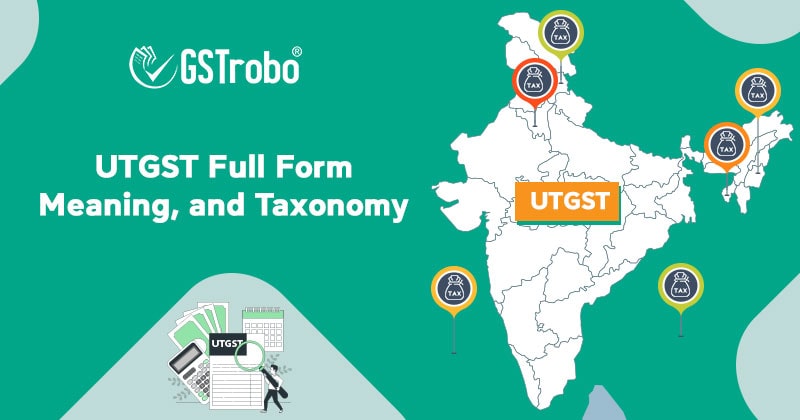UTGST Full Form, Meaning, and Taxonomy
On April 12th, the Union Territory Goods and Services Tax, or UTGST, was enacted by the UTGST Act, 2017. The UTGST is an Act that makes provisions for the charging and collection of tax on all intrastate goods and services. In the case of UTGST, Central Government collects the tax.

What are UTGST and the Full form of UTGST?
Union Territory Goods and Service Tax is covered under the UTGST Act. UTGST is an abbreviated form of Union Territory Goods and Services Tax that is levied on goods and services. In addition to the Central GST (CGST), the UTGST is charged.
List of State Where UTGST is Applicable
The UTGST only applies to union territories that do not have their legislature, which includes the following union territories:
- Lakshadweep
- Daman and Diu
- Dadra and Nagar Haveli
- Chandigarh
- Andaman and Nicobar Island
The Reason behind the Introduction of UTGST
The State GST (SGST) cannot be implemented in a Union Territory without legislation, which is why UTGST is applicable in GST.
To address this issue, the GST Council agreed to create a Union Territory GST Law (UTGST) that is comparable to the SGST. SGST, on the other hand, can be implemented in Union Territories like New Delhi and Puducherry, because both have their legislatures and can be deemed “States” under the GST system.
What are the three forms of GST Applicable under GST?
Any transaction may be subject to one or more of the following tax combinations:
- CGST + SGST/UTGST for supplies of goods and/or services within Union Territories or State (Intra-UT).
- IGST is applicable to the supply of goods and/or services between states and/or union territories (inter-state/inter-UT).
How to Utilize ITC under UTGST?
The tax paid on inputs is credited as an input tax credit (purchases). It can be deducted from the amount of output tax paid to the government.
Section 9 of the UTGST Act specifies that if a registered person has input tax credit in his ledger (in electronic form), it must be used in the following manner:
- If you have an IGST input tax credit, use it first against IGST, and if any amount remains, use it against CGST, SGST, or UTGST in that sequence.
- Similarly, if the CGST has no balance, the UTGST credit input should be taken off against Union Territory tax first, and then applied against the IGST.
In other words, any input tax credit, whether CGST, SGST, or IGST, must be set off against payment of the same sort first.
Power to Grant Exemption under UTGST
The Central Government can exempt a taxpayer from paying the tax in certain circumstances, as specified in Section 8 of the UTGST Act, which states the circumstances in which an exemption can be granted:
- Exempt generally either absolutely or subject to such conditions as may be specified therein, goods or services or both of any specified description from the whole or any part of the tax leviable thereon with effect from such date as may be specified in such notification.
- With its authoritative power, the Central Government can issue special orders for goods or services for which an exception should be made in order to encourage their use or for any other reason mentioned.
- The Central Government may, if it considers necessary or expedient so to do for clarifying the scope or applicability of any notification issued under sub-section (1) or order issued under sub-section (2), insert an explanation in such notification or order, as the case may be, by notification at any time within one year of issue of the notification under sub-section (1) or order under sub-section (2), and every such explanation shall have effect as if it had always been the part of the first such notification or order, as the case may be.
In simple terms, if the government grants an exception for any goods or services supplied by a registered person, that tax should not be collected by the person on the goods or services specified by the government.
UTGST Demands and Recoveries
As per section 12 of the UTGST Act:
- Assume that a registered person has paid the UTGST on a transaction that he considers to be an intra-State supply. However, it was later determined to be an inter-State supply. The registered person will be refunded the amount of tax paid in this scenario.
- Furthermore, if a registered person paid integrated tax on a transaction that he thought was an inter-State supply but was later determined to be an intra-State supply. As a result, that registered person will not be obliged to pay any interest on the CGST and UTGST that is due.
- If a registered person fails to pay any tax, according to Section 13 of the UTGST Act, 2017, such person must pay interest or penalties to the government.
- In addition, during the recovery of tax arrears, the proper officer of central tax may recover the amount from the individual (as if it were central tax arrears) and credit the amount so recovered to the Government’s account under the heading of Union territory tax.
- If the amount recovered under section 13 (1) is less than the amount due to the Government under the UTGST Act and the CGST Act, the amount to be credited to the Government’s account should be proportionate to the amount payable to both Union territory and central tax.
